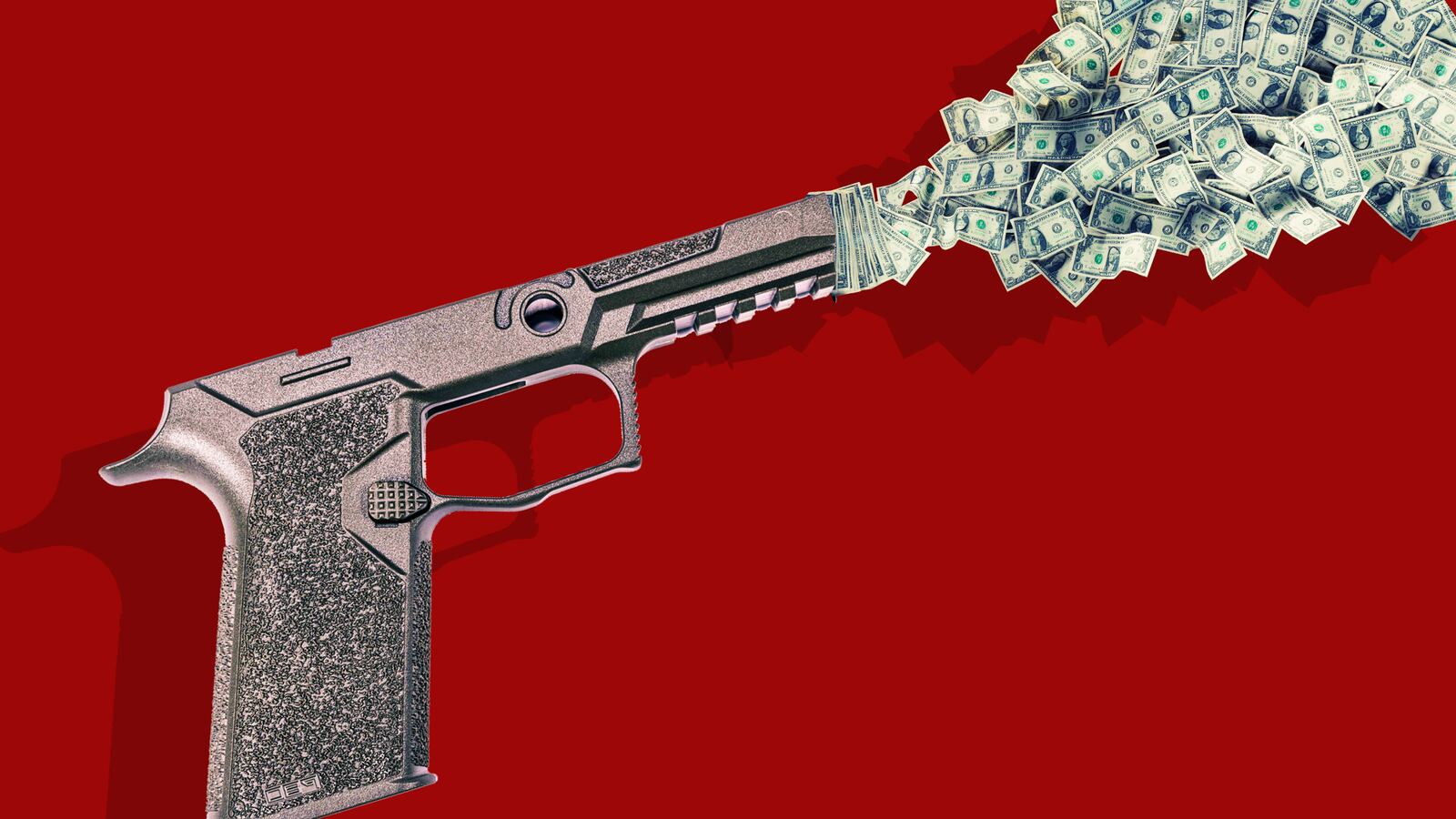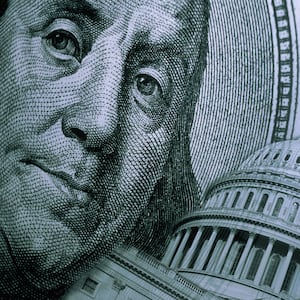Last December, the Bureau of Alcohol, Tobacco, Firearms and Explosives (ATF) raided a Dayton, Nevada, company called Polymer80. The 10-year-old firm sells complete “Buy Build Shoot” kits, which come with all the necessary parts needed to make your own gun—except serial numbers.
These so-called almost-guns are also known as “ghost guns” because they’re untraceable. Attractive to criminals for their anonymity, Polymer80 guns have been used in “hundreds of crimes throughout the United States,” according to the ATF warrant, listing, among other infractions, kidnapping, carjacking, domestic violence, robbery, and homicide.
One example included in the warrant concerned two Los Angeles County Sheriff’s Department deputies who were ambushed and shot in an apparently unprovoked attack while sitting in their patrol vehicle. “The firearm used in the attack was identified as a Polymer80, model PF940c, handgun,” the warrant states.
The “almost-guns” sold by Polymer80 are exactly that: nearly finished frames and components that can be turned into an operable firearm with a few hours’ work. The ATF warrant application said the kits meet “the federal definition of a firearm” and the firm was violating U.S. law by ignoring regulations required of gun sellers, such as background checks on customers. Because of Polymer80’s alleged willful ignorance, the ATF said, the company shipped prohibited items to felons and overseas buyers.
The ATF investigation began in February 2020, the warrant stated. Two months later, Polymer80 received a $371,000 Paycheck Protection Program loan from the federal government.
A company like Polymer80 might not seem like the type to ask for government assistance. But even stranger was the fact that in order to get the funds, Polymer80 attested on its loan application, under penalty of perjury, that the company needed the money to save 31 jobs. At the same time, Polymer80 was making exuberant public statements about record sales, which ran counter to the dire financial state the company swore under oath it was experiencing when it requested an emergency bailout.
Today, Polymer80’s winning streak appears to continue, informing job applicants that it is “HIRING IMMEDIATELY!”
“There’s a lot of hypocrisy here,” Justin Wagner, director of investigations at Everytown for Gun Safety, the nonprofit founded by billionaire businessman and former New York City Mayor Mike Bloomberg, told The Daily Beast. “I’d say it’s just another example of the gun lobby trying to game the system.”

Polymer80 80% frames on sale at a store in California. So-called ghost guns can be assembled from kits and are not traceable by law enforcement because they lack serial numbers.
Bing Guan/Bloomberg via GettyUsing official data released by the Small Business Administration (SBA), Wagner analyzed the first tranche of PPP loans disbursed under the Trump administration and found nearly $83 million went to some 285 firearms manufacturers, importers, and distributors in the U.S., all of them enjoying what was inarguably a banner year. If you include all firearms-related businesses and organizations that got PPP loans, such as state NRA affiliates, shooting schools, and the like, the money climbs to almost $160 million.
“The gun industry certainly did experience a surge of sales in 2020,” Wagner said. “And when applying for these loans, the applicants had to certify that current economic uncertainty made the loan request necessary to support their ongoing operations. I think what the data shows, when contextualized with these companies’ success during that year, is that there are a lot of questions as to whether those certifications were true.”
Polymer80 executives did not respond to requests for comment. An SBA spokesperson told The Daily Beast that the agency “does not comment on individual borrowers.”
Although millions of applicants were unable to access any funds, the PPP program was a very necessary lifeline to many of the 8.5 million U.S. businesses that did. The loans were forgiven if the business used the money to avoid laying off employees—something the Everytown report describes as “a likely outcome for many in the gun industry, who due to high demand in 2020, looked to add, not shed, workers.” The Everytown report questions whether some companies needed a bailout to keep the lights on.
“[H]ow would a diner owner feel when they didn’t get a loan, but a manufacturer of AR platforms or of ghost guns did?” said Wagner. “I think the answer to that is pretty clear: they’d be pretty furious.”
Roughly 39.7 million federal background checks for legal gun purchases were processed in 2020, a 40 percent rise from 2019, and some 22 million firearms were sold at the retail level, according to Everytown’s estimates. Wagner’s report for Everytown, which was exclusively shared with The Daily Beast prior to publication, was not intended to “cast aspersions” on guns or gun companies, he said. Rather, he wanted to highlight that some companies’ statements to the public, whether on social media or on investor calls, were the complete opposite of what they were telling the government in applying for PPP loans.
One example highlighted in the Everytown report is firearms accessories retail giant Brownells, Inc. Appearing on Fox Business in August 2020, chairman Pete Brownell spoke of a 90 percent jump in gun sales since the beginning of the COVID pandemic. A former president of the NRA, Brownell resigned amid congressional inquiries into a 2015 visit he made to Russia, which was hosted by Russian officials and Maria Butina, who was convicted in 2018 of being a covert Russian agent.
“We could receive truckloads of nine-millimeter [and] we can sell it in hours where it used to take weeks—weeks to a month,” he said during a segment on the network’s Varney & Co, adding, “This ‘defund the police’ movement is driving people to worry about personal security. And it’s still going to have a demand that’s going to outstrip supply.”
Still, Brownells applied for, and received, a $5 million PPP loan in April 2020.
Another company singled out for scrutiny by Everytown is firearms manufacturer CZ-USA, a Kansas City-based division of Czech gunmaker Česká Zbrojovka. Months after receiving a PPP loan for more than $1.4 million, CZ-USA announced that it was acquiring Colt, the venerable American firearms producer, as well as a Canadian subsidiary, for $220 million in cash and $18.65 million in stock—a move Wagner called “pretty brazen.” (Brownells and CZ-USA were contacted for comment.)
The list goes on. In a March 20, 2020, Instagram post, Bill Wilson, president of Wilson Combat in Berryville, Arkansas, said the company, which specializes in high-end custom handguns, rifles, and shotguns, “has remained open, fully staffed and fully operational. We have a steady supply of merchandise being produced and there has been minimal disruption to production at our facility,” adding that employees were “working diligently” to fill orders in the face of “increased demand.” On April 6, Wilson Combat received a PPP loan of $1.8 million.
Big Woods Goods of Canton, Georgia, is the gun shop where 21-year-old Robert Aaron Long bought a handgun before he killed eight people in a March 16, 2021, shooting spree that targeted Asian massage parlors in the Atlanta area. According to Everytown, the Big Woods Goods Facebook page suggests “surging demand,” with posts elsewhere on social media that “raise serious questions about the business, ranging from use of armed young children, a post featuring an Islamophobic dog whistle, and a video parodying how customers could circumvent ATF regulations concerning short barrel rifles.” On April 27, Big Woods Goods received a PPP loan for $68,308.
Another manufacturer of ghost guns, New Frontier Armory of North Las Vegas, Nevada, received a PPP loan for $271,000 in April 2020. A year earlier, the company allegedly sold a half-dozen high-capacity magazines, including one that holds 100 rounds, to undercover investigators in New Jersey, where they are illegal. Attorney General Gurbir S. Grewal later sued the company for ignoring a cease-and-desist letter demanding they stop shipping the products to New Jersey.
As for Polymer80, the company is in the process of being sued by Washington, D.C. Attorney General Karl Racine, who alleged that more than 80 percent of the 250 ghost guns recovered by D.C. police over the past four years were made by Polymer80, nine of which were linked to homicides, and Los Angeles City Attorney Mike Feuer, who alleged Polymer80 was behind more than 700 ghost guns seized by the LAPD in 2020.
According to Wagner’s research, the COVID-19 pandemic “appears to have created significant demand among DIY gun makers, who profile their ‘Anti-Virus P80’ and ‘Second Pandemic’ builds on websites like Reddit.” At one point, a majority of Polymer80 parts and kits were out of stock across 65 companies distributing them. To that end, Polymer80 commented on its own July 4, 2020, Facebook post, saying it was trying to “satisfy a massive amount of retailer orders.” About 10 weeks later, the company again mentioned “overwhelmingly high demand.”
In the first six months of 2021, Philadelphia police have reportedly seized 260 ghost guns so far, compared to 250 in all of 2020. Wagner, a former prosecutor for the New York State Attorney General’s Office, said ghost guns have become the “weapon of choice” for white supremacists, gangs, and drug dealers.
To the contrary, Polymer80 says on its website it “designs and develops innovative firearms and after-market accessories that provide ways for our customer to participate in the build process, while expressing their right to bear arms. This provides a fun learning experience and a greater sense of pride in their completed firearm, strengthening our brand loyalty.”
This “fun learning experience” can present a vexing—and dangerous—problem for law enforcement because it means that there are more firearms in circulation that are unaccounted for.
Fifty years ago, when the Gun Control Act of 1968 established the regulatory regime that exists today, it was hard to make a gun. It required having access to a machine shop with extremely expensive industrial equipment, hard-to-obtain raw materials and precision-milled parts, as well as deep technical knowledge and gunsmithing skills. Because very few people had the ability to build a firearm at home, the federal government made the decision not to restrict so-called private builds.
But advances in machining have now made it easy enough, and inexpensive enough, for individual consumers to do it on their own, said Warren Eller, a professor at New York City’s John Jay College of Criminal Justice who studies gun violence and gun laws.
“We’re at the point now where you can print the lower receiver for an AR-15 on a 3D printer,” he said. “All of the code to do that with a CNC machining tool is out there in cyberspace, and we’re never going to put that genie back. So the ways to limit this are pretty slim.”
While there are legitimate gun owners and hobbyists out there who enjoy building their own personalized weapons, the private build-kit industry has “now been taken advantage of by ne’er-do-wells,” he said.
One former ATF supervisory special agent who spent nearly three decades with the agency speculated that the ATF investigation may have even influenced Polymer80’s decision to apply for a PPP loan.
“All I know is that if they got raided by ATF, it could have been a signal that, ‘Maybe we’re not going to be able to continue doing this in a few months or a year,’” the former agent said, envisioning a warehouse full of now-unsellable inventory. “‘What are we going to do with all this stock?’”
The ATF is now seeking public comment on a proposal to amend the existing regulatory definition of what exactly constitutes a “frame or receiver.” Under federal law, a firearm is any weapon “designed to expel a projectile or projectiles by the action of an explosive,” or that “may readily be converted to expel a projectile.” The ATF’s position is that, because today’s “unfinished” build kits are so easily finished, they should be defined as firearms.
This could conceivably put the industry out of business, the former ATF agent said.
“If that definition holds, then every kit they produce would require a unique serial number,” said the former agent, who requested anonymity to preserve professional relationships in the private sector, where he now works.
“To make it, you would have to have a manufacturer’s license. If you have a manufacturer’s license, now you’ve got to keep records. And that would defeat the whole draw for some people, like gangbangers, who might not want to buy this thing anymore.”







